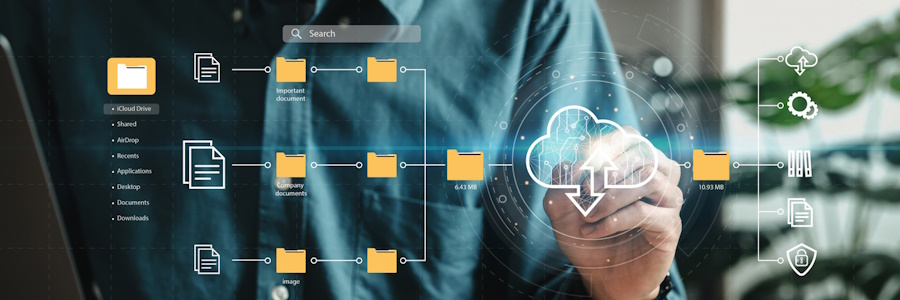As a business owner, you know that your business needs data backups to prevent operations from being paralyzed when a data loss event occurs. But which of the many data backup solutions on the market is right for you? Two popular options are cloud-based and on-premises backup solutions, each offering its own set of advantages. These two can also be combined for a comprehensive, ironclad data protection solution.
Let’s look at the advantages each of these systems provides so you can make an informed decision on which setup best addresses your business’s unique requirements.
What’s the difference between cloud and on-premises data backups?
Cloud-based backup solutions involve storing your business's data in remote servers hosted and managed by third-party providers. Your data is encrypted and stored securely at one or more off-site data centers, and your team can access your backups from anywhere with an internet connection.
By contrast, on-premises backup solutions involve storing your data on local servers or storage devices located within your physical premises. On-premises backup solutions provide you with complete control and ownership of your data, as well as fast access to backups without relying on internet connectivity or a third party.
Some hybrid backup solutions store data in both an on-site and “immutable” cloud-based backups that cannot be erased, giving you the ultimate data protection.
Essential factors to consider in choosing data backup solutions
When deciding between cloud and on-premises data backup solutions, make sure to consider the following:
Costs
Cloud-based backup solutions typically operate on a subscription-based pricing model, so you only pay a fee based on your usage and requirements without having to shell out for hardware. While this model offers flexibility and scalability, costs can add up over time, especially as data storage needs grow.
On the other hand, on-premises backup solutions require an upfront investment in infrastructure, hardware, and software. While initially more expensive, on-premises solutions let you control expenses better in the long run, and you can improve value by extending the life span of your backup solution.
Accessibility and remote access
Cloud backups let you access your data anywhere, anytime, offering unparalleled accessibility that’s particularly beneficial for businesses with multiple locations or distributed teams. What’s more, cloud backups store data off site, which means that even if your local hardware fails or experiences a disaster such as fire, flood, or theft, your information remains safe and retrievable through the cloud.
Meanwhile, on-premises backup solutions often require physical access to the backup infrastructure to work. While some on-premises backup solutions offer remote access features, they may not be as robust or convenient as cloud-based solutions. Users may need to set up complex VPN connections or remote desktop access to retrieve data remotely, which can be less convenient and more prone to technical issues.
Security and compliance
Cloud-based backup solutions typically come with encryption, authentication, access controls, and many other security features to protect your data backups from unauthorized access and breaches. Additionally, reputable cloud providers adhere to industry standards and compliance regulations, making it easier for businesses to achieve compliance, even if they belong to an industry with strict data security laws regarding backups.
On-premises backup solutions, on the other hand, give you full control over security measures. Keep in mind that this may require additional investments in cybersecurity tools and in-house expertise, as you need to verify compliance yourself.
Reliability and redundancy
Cloud-based backup solutions offer built-in redundancy and high availability, as they replicate your data across multiple servers and data centers. This ensures your data is protected and can be reliably restored even in the event of severe disaster.
On-premises backups also offer built-in redundancy but through local replication. This can be advantageous if you prioritize physical control over your data or have concerns about a disaster impacting the cloud provider's facilities.
Having a hybrid solution that allows you to restore data from a local backup (and only have to restore from the cloud if a disaster strikes) gives you peace of mind that you will always be able to restore from your backups, no matter what.
Making the right choice
The ideal backup solution depends on your priorities. Choose cloud backups for strong built-in security, ease of compliance, and disaster recovery from remote events, but make sure to partner with a dependable provider with robust measures. Opt for on-premises solutions for complete control and potentially lower costs, but be prepared to invest in hardware and cybersecurity tools. Also expect to manage compliance yourself, which can be less ideal for businesses in industries with stricter regulations.
For ultimate protection, some businesses combine cloud and on-premises backups, creating a hybrid solution that strikes the right balance between convenience, security, and control.
If you need assistance determining which data backup solution is best for your needs or you want guidance on crafting a comprehensive solution that incorporates both systems, contact Fidelis. We have over 15 years of experience crafting secure and reliable backup solutions for Seattle-area businesses, and we can ensure your solution protects all that you’ve built from any unforeseen disaster.


